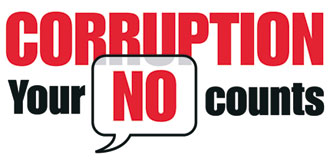
|
 |
 |
|
|
|
|
|
|
|
|
|
|
|
|
|
|
|
|
|
|
|
|
|
|
The Need to Fight CorruptionNothing destroys a country and shortens its life span like corruption. It is a monster that destroys everything around it and even those who benefit from it. The problem is not in the very existence of corruption, which is impossible to eradicate. It must be said that it is difficult to find a country that is free of corruption. Therefore, the real problem lies in the size of corruption and the ability to contain it. What we referring to here is the containment of corruption within possible limits, so that it cannot spread like cancer and destroy both society and state. Corruption is the opposite of righteousness and reform. Because we desire comprehensive reform in Bahrain, we should without any doubt address this subject. The issue is more complicated than just financial corruption, as it transcends all aspects of life to include political, cultural, judicial, media and administrative areas etc. Although societies tend to stereotype and associate corruption mainly with financial issues, it is impossible to confine it to one area only. Like cancer, corruption spreads to surrounding areas and affects government apparatus, ordinary individuals and institutions. This eventually leads to corrupt the judiciary, security, culture and even the conscience and minds of ordinary people. Corruption is a danger that threatens communities by destroying its resources, so that governments will not be able to meet the requirements and basic needs of its people. Due to this, corruption incites hatred towards the political system and officials and might cause a system to collapse by losing its legitimacy and this will eventually encourage citizens to confront the system and attempt to topple it. At the least, corruption creates political and security tensions as is the case in many countries.
Part of the nature of corruption is that it produces a culture that supports it. For instance, we find that there are many individuals who are quick to criticize corruption when, in reality, they are involved in it or justify it. For instance, some justify the existence of corrupt officials arguing that if they were to be changed, more corrupt individuals, who are hungrier than their predecessors for wealth and power, would replace them. Some even believe that officials are not corrupt when they exploit public money, as this money essentially belongs to them and, hence, they have the right to do with it as they wish! Corruption also reduces the individual’s sense of humanity and patriotism for his/her country as well as reduces their national pride. When corruption is accepted as a norm in a society, the irony is that ‘corrupt persons’ are perceived as ‘clever persons’ while ‘honest persons’ are perceived as ‘stupid persons’. Corruption exists in Bahrain as in any other country in the world. However, we do not know its scale due to the lack of transparency. Corruption is also widely discussed by officials and citizens who have pointed to some of its forms. It is necessary to understand the exact size of this problem, discuss its causes, bring the corrupt to justice and provide all information relating to this issue. We believe that corruption in Bahrain is still controllable; however, it is spreading which endangers the reform project, makes government apparatuses in-effective, and distorts national spirit. Undoubtedly, combating corruption is a priority and it is obvious that the sources of corruption are connected to wealth and power, and whose decisions have a great impact on society and the state itself. What we truly need is not merely a moral and religious deterrent as the temptation of power and wealth is far greater. Additionally, there is also need for the following: A strict law, and also committees, for combating corruption, far from the influence of corrupt individuals, otherwise these committees will also be corrupted. The problem is not whether a law exists or not, despite its importance, but lies in its firm implementation by political leadership, and the existence of a firm and independent judiciary. Social supervision through media and legislatives. A national culture that views corruption as strange, harmful and dangerous to replace the existing culture that ignores the exploitation of public money. Frankly, there is need to take a tough stance against this monster before corruption becomes uncontrollable. |
